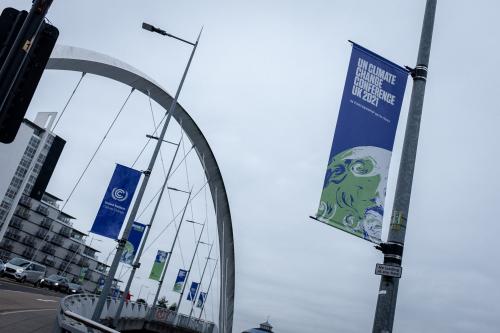This is the first blog in a two-part series on the city network Urban 20 (U-20). This article introduces the U-20. The second article examines the U-20 final communique, its relationship to the G-20 proceedings, and possible pathways for evolution.
While all eyes were on President Trump’s attendance at the G-20 Leaders Summit this past weekend hosted by Saudi Arabia, he is not the only U.S. political leader who engages with counterparts under its umbrella. From September 30 to October 2, mayors and city representatives came together under the banner of the Urban 20 (U-20), to shape an urban agenda to influence the priorities of the national leaders of the G-20. As the COVID-19 crisis has shown, cities often comprise the front lines of global issues, filling gaps in leadership left by inadequate national and international responses. Mayors are thus seeking to play an increased role in shaping multilateral coordination and influencing policymaking among national governments as key global governance issues are decided. The U-20 is a unique manifestation of this aspiration, as it provides its members a direct link to an established, influential multilateral body.
U-20 members: Influential global cities with economic clout
The U-20 was launched in 2017 under the leadership of Mayor Horacio Larreta of Buenos Aires and Mayor Anne Hidalgo of Paris to insert an urban perspective into the deliberations of the G-20. It is co-convened by two of the most powerful city-to-city networks, C40 Cities and United Cities and Local Governments (UCLG).
The U-20 establishes its credibility via the economic power and political influence of its participating cities, which include some of the largest from the G-20 countries (see Figure 1). All G-20 countries except India have had cities represented. Several countries had more than one city endorsing this year’s communiqué as U-20 members: South Africa had three, while the United States, France, Italy, Brazil, Japan, and Turkey had two. Currently, the host city decides which cities to invite from the G-20 countries and the participation of specific cities can vary from year to year: Barcelona, Istanbul, Izmir, and Riyadh (this year’s host city) joined for the first time this year, while Hamburg and Chicago were not represented in 2020 after participating in 2018 and 2019. A group of observer cities has also attended each year; this year that included Amman, Amsterdam, Helsinki, Miami, Rotterdam, and Singapore, among others.
Figure 1. G-20 members and Urban 20 cities endorsing the U-20 2020 communiqué
Source: Final urban 20 communiqué and The Guardian. Map by Kait Pendrak.
The economic weight of the participating cities is formidable. In some instances, they command a significant portion of their countries’ respective Gross Domestic Product (GDP) (see Figure 2). In aggregate, they represent more than 16 percent of the total GDP of the G-20 countries. They also dominate the domestic spending market, powering economic growth in their respective countries. The collective economic potential that they wield, and the central role they often play in driving growth, innovation, and commerce in their home countries, provides a strong rationale for engaging G-20 ministers and leaders on the global issues of the day.
Figure 2. The share of Urban 20 metro areas in their national economies varies
The Urban 20 process: Mirroring the G-20
To a large extent, the structure and proceedings of the U-20 mirror the G-20 process. Sherpas from participating cities met multiple times to reach a common position and draft a communiqué endorsed at a final mayors summit. Under this year’s Riyadh presidency, the U-20 organized task forces to address three priority themes selected by the cities: “Circular, Carbon Neutral Economy;” “Nature-Based Urban Solutions;” and “Inclusive Prosperous Communities.”
The thematic focus areas offered city government experts and organizations, such as the OECD, ICLEI, Metropolis, and Brookings, the opportunity to join and inform the process with white papers and policy recommendations. The task forces then developed policy recommendations to feed into the U-20 Communiqué, as well as provide input to the G-20 Sherpas track.
The U-20 presidency brokers the exchange of information between U-20 and G-20 working groups, informing ministerial meetings of U-20 recommendations. This year, the U-20 sent information in advance to the G-20 Sherpa Meeting and the Ministerial Meeting, and at the U-20 Mayors Summit presented its final U-20 communiqué to the G-20 chair. This year, for the first time, the G-20 Sherpa of the host country, Saudi Arabia, delivered a speech during a U-20 Sherpa meeting.
A city-led collective action with political weight and responsibility
As emerging actors of global affairs with their own agency, cities of the U-20 must walk a fine line, presenting recommendations in a collective manner that reflect their interests, and that are both credible and accessible to the G-20 leadership.
Currently, about two-thirds of the current U-20 cities are led by a politician from a different political party than the ruling party of their national government. Partisan differences among different levels of governance do not necessarily prevent the ability to influence or engage in cooperation. Yet national leaders, who are already naturally resistant to ceding authority to shape and decide the collective global agenda, have little incentive to provide high-profile opportunities for leadership from their domestic opposition, let alone provide a platform for domestic tensions to play out on a global stage.
The U-20 represents one of the most interesting attempts to broaden global governance beyond the strict nation-state paradigm, and to integrate the interests of cities into an established structure of global cooperation.
The rhetoric of city diplomacy and mayors as leaders focuses on pragmatism and solving problems. However, city leaders are not all always independent voices. For example, city leaders in Russia, China, and Saudi Arabia may negotiate positions based on guidance or influence from their national government, blurring the lines of city-specific voices. Like-minded cities in the U-20 aligned with progressive values may also face external resistance that undermines the making of a consensus-built urban agenda that reflects the interest of residents.
The U-20 proceedings this year also highlighted that geopolitical considerations and national tensions can complicate the objective of putting forward a collective perspective to influence the G-20. Human rights organizations called on cities to boycott the Mayors Summit, which was held on the anniversary of the murder of journalist Jamal Khashoggi, based on human rights concerns, including the detention by Saudi Arabia of prominent women’s rights activist Loujain al-Hathloul. This weekend even saw a counter-G-20 Summit hosted by human rights groups and joined by some U.S. and European elected representatives.
City leaders are not neutral actors impervious to concerns over human rights, the independence of justice, and transparent government. These principles are part of an effective and democratic urban agenda. The withdrawals by the mayors of London, Los Angeles, Paris, and New York City in the final mayoral summit demonstrated that a city-led agenda for pragmatic reform of global economic cooperation remains grounded in political considerations. At the same time, the U-20 provides—again, somewhat uniquely among city networks—an alternative “diplomatic” platform for cities to project their political perspectives, especially when they diverge from the position or actions of their national governments.
Conclusion
The COVID-19 crisis has reemphasized the important role and leadership of cities on the front line of global challenges. The U-20 represents one of the most interesting attempts to broaden global governance beyond the strict nation-state paradigm, and to integrate the interests of cities into an established structure of global cooperation. Given the global implications of rapid urbanization and the central role that mayors and local governments are playing in addressing global problems, it is likely that such attempts by cities to ensure their interests are represented in global policymaking will continue to grow.
Though a relatively new city network, the relationship between the U-20 and the G-20 offers a significant opportunity for an original institutional linkage between city diplomats and the multilateral system. The urgency of the global moment beckons, providing an important opportunity for the U-20 to become a model that provides an authentic and influential urban voice in global governance. The next evolution of the U-20—and city diplomacy—cannot come too quickly. The Riyadh presidency of this year U-20 also revealed a new conundrum: The more cities and local leaders seek to strengthen their voice at the international level, the more exposed they are to geopolitical tensions that stray from the generally pragmatic and problem-solving orientation of most city networks—which makes arriving at urgent solutions more complicated.








Commentary
The Urban 20 (U-20): Seeking to influence the G-20 through city diplomacy
November 24, 2020